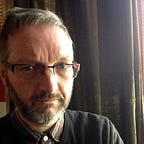Slow Epiphanies
For BBC Radio 4 on the silent witness of trees and life’s gradual, halting revelations.
Over Christmas we made our regular family pilgrimage along London’s Regents Canal to the ancient grounds of Old St Pancras Church, near Kings Cross.
To our dismay we discovered that The Hardy Tree has fallen.
The Hardy Tree, if you’re unfamiliar with its legend, is named for the novelist Thomas Hardy, an engineer long before he wrote Tess of the D’Urbervilles.
In the 1860’s the construction of the Midlands Railway Line to Sheffield, ran through a graveyard and Hardy’s job was to move the bodies.
Afterwards he lay scores of gravestones around the base of an ash tree and in the generations since, the tree roots have entangled themselves with the headstones, the living and the dead becoming one.
But a storm brought the tree crashing down in December and I thought of it yesterday, taking our own, slightly more modest, Christmas tree down.
A small revelation, how trees are a silent witness to history.
‘This is not our world with trees in it,’ as the novelist Richard Powers puts it. ‘It’s a world of trees, where humans have just arrived.’
The C4th Christian teacher Augustine described two books of revelation — a book of nature as well as a book of scripture.
The book of nature was written billions of years before any books of scripture, but people of faith have often preferred the scripture to the nature, the text on the page to the texture of forest or mountain or ocean.
Today we understand the language of nature as never before, we can almost speak it.
How trees communicate in subterranean networks or absorb the carbon dioxide emissions that heat the planet.
It’s proving a slow epiphany for humanity, a gradual dawning that nature is more relative than resource, that everything is connected to everything else.
Christians celebrate the festival of Epiphany this weekend, the strange story of ancient astronomers, following that yonder star, to a eureka moment in a Bethlehem stable.
For most of us there is no divine sat nav, our map-reading skills are rudimentary and our epiphanies slow burning.
But every now and then we realise that a hunch we’ve had was true and right, long before we’ve ever said it out loud.
We suddenly know what we are to do.
Perhaps this follows a period of stillness or calm — maybe prayer, mindfulness or meditation — but it’s not confined to the devout.
It’s an entry to a place below our everyday thoughts from which a divine clarity may emerge, slowly helping us see what we previously couldn’t.
A gradual, halting epiphany.
To make some change in our lives in 2023.
To end — or begin — something.
To pay attention to the holy book of nature and walk more lightly on the good earth we share.
